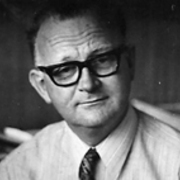
Barry Shaw
A passionate advocate of telling local stories well, Barry Shaw was on hand to frame, critique — and often praise — many key moments in the evolution of Kiwi television storytelling, from Moynihan to the birth of Shortland Street. Then NZ Herald editor-in-chief Gavin Ellis argued in an obituary that readers followed his criticism "very closely"; "He became an institution on not only television criticism, but also television news — about what was happening on television."
Shaw was born in Palmerston North in 1929, son of journalist Clayton Shaw. Later he spent time in England, where he wrote for the Manchester Evening News and met future wife Patricia. After returning to New Zealand in the 60s, Shaw began writing about television for The Auckland Star, in an age when critics often treated local TV with some cynicism. In the late 70s he moved to The New Zealand Herald, where he spent the rest of his career, aside from a period tutoring as part of the Auckland Institute of Technology journalism course.
Shaw praised early Paul Maunder drama One of those People who Live in the World (1974), plus “tautly written, briskly played and expertly directed” series Moynihan, starring Ian Mune as trade unionist Leo Moynihan. Three years later, when high-rating revisionist epic The Governor made front page news for its supposedly “extravagant” budget, Shaw was a key defender.
Noting PM Robert Muldoon’s opposition to the series, Shaw argued in the Star that The Governor had "made Māori matter. If Pākehā now have a better understanding of the Māori point of view; if the Māori, particularly the younger generation, now have a pride in their race, it stems from The Governor. Now, how do you measure that in dollars?".
His tastes ranged widely. He praised 40s-era series Country GP, the TV debut of Paul Holmes, and perceptively reviewed landmark tele-movie Mark II, saving his ire for the later’s Guy Fawkes Night time slot. While admitting the actions of its Polynesian teenagers would win little approval from older, white viewers, Shaw argued that much of “what the trio did could be understood — if you had eyes and ears to see and to hear, and also a heart to feel.” Mark II confirmed his belief that well-made local drama meant much more than pale imitations of foreign formats.
Shaw was on hand for television milestones across four decades. The week Shortland Street went on air in 1992 — two years before Shaw’s own retirement — he argued that the show "looks to have all the essentials for survival as a continuing series, provided that the players do not expire with mental and physical exhaustion, such is the production's unrelenting pace". Shaw would be right, while many naysayers turned out to be wrong.
Shaw did not lose his enthusiasm over time, a pitfall for many who are paid to criticise. In a 1999 interview, veteran commentator Keith Quinn recalled Shaw’s 1973 review of his first stint commentating an All Blacks game: that Quinn was excitable and talked too much. “Then, a few weeks ago, there was a letter to the Herald from the same Barry Shaw defending me at this tournament, which was a pleasant thought."
Though enthusiastic about local stories and talent on screen, Shaw was unafraid of putting the boot in where he saw fit. Veteran gossip columnist David Hartnell has spoken of having often been in Shaw’s firing line.
Shaw continued to create the occasional headline even after retirement. In 2006, a group of concerned Kiwis called on TVNZ to slash advertising and adopt a publicly-funded broadcasting system; both Shaw and TV executive son Andrew were vocal in rubbishing the group’s claims. Shaw senior likened the group to a bunch of pterodactyls, making comedy of their desire to resurrect early Kiwi soap Close to Home, which he called "puerile and agonising television in slow motion" (Shaw much preferred short-lived 70s soap A Going Concern). Shaw argued that maintaining quality programming while cutting advertising would require accepting a licence fee. "If people want a channel that is not debased by the number of commercials, you have to pay for it."
He was also active in his community, campaigning for community facilities in West Auckland (a walkway in Henderson was later named in his honour) and promoting walking tours of Auckland’s Waikumete Cemetery.
Shaw’s interest in television was clearly infectious — aside from his daughter Jane (who is a teacher), all of his children have ended up in the screen industry: children’s show host turned TV executive Andrew, journalist and news producer John, and editor Bryan.
Dean Beresford Shaw — though thousands of readers knew him as Barry — passed away on 22 August 2011. He was 82.
Sources include
Barry Shaw, 'Moynihan on Gold Standard' (Review) - The Auckland Star, 26 May 1975
Barry Shaw, 'And for the Next Epic?' - The Auckland Star, 7 November 1977
Barry Shaw, Review of Mark II - The NZ Herald, 6 November 1986
Louisa Cleave, ‘How Shortland Street killed that awful cringe factor’ - The NZ Herald, 30 June 2000
Trisha Dunleavy, Ourselves in Primetime: A History of New Zealand Television Drama (Auckland University Press, 2005)
David Eames, ‘TV ‘dinosaurs’ slammed as years out of touch’ - The NZ Herald, 17 February 2006
Wynne Gray, ‘Family moment something for the memoirs’ (Interview with Keith Quinn) - The NZ Herald, 8 November 1999
Scott Morgan, ‘A life of service to the west’ (Obituary) - The Western Leader, 23 August 2011
Vaimoana Tapaleao, 'TV critic shaped viewers' opinions' (Obituary) - The NZ Herald (Weekend Herald), 27 August 2011, page A13